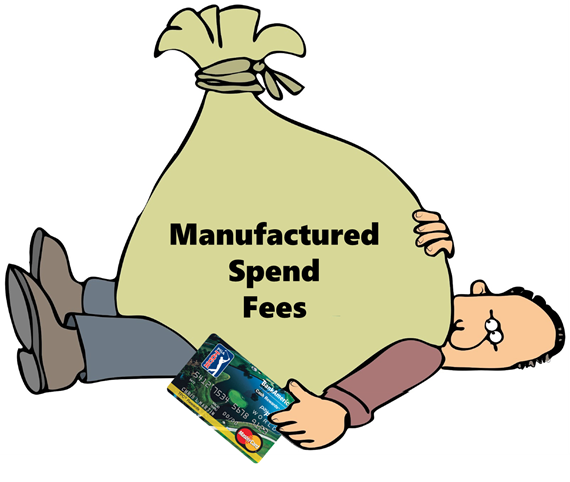Signing up for credit cards is, by far, the easiest and quickest way to get huge numbers of points and miles. By signing up for cards regularly, it can be easy to earn hundreds of thousands of points per year. There is, though, a significant obstacle to this approach: Most big signup offers have big spend requirements. A typical offer, for example, requires $3,000 of spend within the first 3 months of card membership. Some spend requirements are much higher. For example, I recently signed up for an Amex Business Platinum offer that requires $20,000 of spend in 6 months to get the full bonus. Even if you don’t go for offers like these, spend requirements can add up to big money very quickly if you sign up for more than one card at a time.

A solution to the minimum spend obstacle is called “manufactured spending”. Manufactured spend techniques are ways of increasing credit card spend without losing much money. For example, until recently it was possible to fund the Target Prepaid REDcard (AKA REDbird) with a credit card and then use those loaded funds to pay off your credit card bill. In that case, no fees were involved at all. In a recent post, I showed options free manufactured spend that still exist. Please see: Free manufactured spend. What’s left?
As free manufactured spend techniques become harder to find, it is worth considering paying for the ability to manufacture spend. Let’s look at some options that are currently available that incur fees:
Pay and get your money back
With the following options, you can use a credit card to pay and get your money back (less fees and expenses):
- Kiva loans: Estimated “fee” (loss due to defaults + cost to tie up money): 1.5%. Kiva does not charge fees for making loans via credit card, but you do risk losing money due to loan defaults. By sticking with “safe” loans, you can minimize this risk, but you can’t avoid it altogether. There is also a cost to tying up your money long-term since loans typically take 6 to 12 months to repay. For full details about manufacturing spend through Kiva loans, please see: Kiva: loans, points, and miles
- Credit card processing (e.g. Square Reader): Estimated fee: 2.75%. Several companies make it easy for small businesses to handle credit card payments. One very popular example is the Square Reader which charges 2.75% per swipe. Theoretically, you can set yourself up as a business and then manufacture spend through the credit card reader. BUT: Most services will shut down your account if they suspect that you are paying yourself. This approach is not recommended.
- Gift cards / reload cards: Estimated fee: .8% to 1.3%. It’s possible to buy Visa or MasterCard gift cards and use them as debit cards in ways that will result in getting your money back. Fees vary quite a bit both with regards to fees for buying gift cards, and fees for liquidating gift cards.
Pay friends
A few services exist that let you pay friends with credit cards. In these situations it should be possible to manufacture spend by paying a friend and asking them to pay you back directly (with a check, for example). You could also set up a circle of friend payments: Person A pays Person B who pays Person C who pays Person A. Unfortunately, the fees for doing this are pretty steep:
- Paypal: 2.9% + 30 cents
- Venmo: 3%
Pay bills
A number of services let you use credit cards to pay bills that you might not otherwise be able to pay with a credit card (e.g. mortgage, rent, utilities, etc.).
Here are a few such services that offer a broad range of bill pay options:
- Evolve Money: 3% fee. Visa, MasterCard, Discover
- Plastiq: 2.5% fee. Amex, Visa, MasterCard, Discover
- ChargeSmart: Fees vary. Amex, Visa, MasterCard, Discover
Then there are services specifically for paying rent:
- RadPad: 2.99% Amex, Visa, MasterCard, Discover (debit cards free)
- Many others. See: Doctor of Credit: Complete List Of Options For Paying Your Rent With A Debit Or Credit Card
And there are services for paying federal taxes (the IRS maintains a list here):
- PayUSAtax.com: 1.87%. Amex, MasterCard, Discover. 2.29% for Visa.
- ValueTaxPayment.com: 1.87%. Amex, MasterCard, Discover. 2.29% for Visa.
- OfficialPayments.com/fed: 2.35%. Amex, Visa, MasterCard, Discover
- ChoicePay.com/fed: 1.88%. Amex, Visa, MasterCard
- Pay1040.com: 1.87%. Amex, Visa, MasterCard, Discover
- Businesstaxpayment.com: 1.87%. Amex, Visa, MasterCard, Discover
Is it worth paying to meet minimum spend requirements?
Sometimes, the value of points earned for spend outweigh the cost to manufacture spend. In those cases, it definitely can be worth paying fees in order to meet minimum spend requirements. For example, suppose you sign up for the Barclaycard Arrival Plus card which currently requires $3,000 spend in order to get a 40,000 point signup bonus. The Arrival Plus card offers 2 points per dollar for all spend and points are worth 1.1% each towards travel (thanks to the card’s 10% points rebate on travel). So, the card earns 2.2% towards travel for all spend. If you were to meet the minimum spend requirements by paying federal estimated taxes with a 1.87% fee, you would come out ahead:
- Pay $2945 in taxes
- Incur $55 fee
- Total credit card spend: $3000
- Points earned on spend: 3000 x 2 = 6000 (worth $66 towards travel)
- 6000 points are worth $66 towards travel, so you come out $11 ahead.
- You meet the $3K minimum spend requirement and earn 40,000 points
The above example shows an approach to meeting minimum spend requirements that is both easy and rewarding. Of course, you can come out even further ahead by using cheaper manufactured spend techniques, but those tend to be more difficult and/or more risky.
Let’s now look at a less obvious example. 3% is at the high end of the fee structures for manufacturing spend. And, some cards offer paltry rewards for spend. For example, outside of its bonus categories, the Marriott Rewards Premier card offers only 1 point per dollar. And, I value Marriott points at only .55 cents each. So, if you use a service like Venmo, with it’s 3% fee, to manufacture spend with the Marriott card (which currently requires $2000 spend for its 70K signup bonus), the fees involved will lead to a net loss (not counting the signup bonus for the card):
- Pay $1942 to a friend via Venmo
- Incur $58.26 fee
- Total credit card spend: $2000.26
- Points earned on spend: 2000
- 2000 Marriott points are worth approximately $11, so you now have a $47.26 loss
- You meet the $2K minimum spend requirement and earn 70,000 points
This is somewhat of a worst case scenario: using the most expensive manufactured spend technique with a card that offers one of the lowest rates of return for regular spend. However, even with this example, the results aren’t too bad. For the $58.26 fee, you would end up with 72,000 points. Even with my conservative .55 cents per point valuation, 72,000 points are worth approximately $400. If I had no better options, I would gladly pay $58.26 for 72,000 points!
Is it worth paying to manufacture spend, without a signup bonus?
Some people manufacture spend to make money (using cash back credit cards). Others manufacture spend to earn points & miles that can sometimes be used for great value towards travel. Either way, one should consider the following factors:
- Costs:
- Fees involved
- Gas, mileage, etc.
- Effort required
- Cost of tying up money (e.g. with Kiva loans, you won’t earn interest on your money and won’t get it back for many months)
- Risks:
- Risks vary by technique. In general, be prepared to have enough money in the bank to cover the possibility of your money being tied up much longer than expected.
- Rewards:
- It’s important to understand how much you value the credit card rewards earned
Overall, your rewards should be much greater than the costs involved in order to compensate for your incurred risk. In general, most credit cards earn rewards worth between 1% and 3% for non-bonus spend. And, since most manufactured spend techniques cost between 1% and 3%, manufacturing spend without a signup bonus is often a losing proposition. To make it worthwhile you would need to seek out ways to increase rewards via category bonuses, big spend bonuses, buying Amex gift cards through cash back portals, etc.
Conclusion
If you’re struggling to meet minimum spend requirements through everyday spend, then its worth considering paying fees to manufacture spend. Some of the easiest options include:
- Pay end of year or estimated federal taxes. 1.87% fee.
- Pay bills that can’t normally be paid with a credit card via Plastiq. 2.5% fee.
- Pay a friend via PayPal or Venmo with a credit card. ~3% fee. Have friend pay you back via check, for example.
If your goal is simply to increase rewards through manufactured spend, things become much more complicated. Make sure you fully understand the costs, risks, and rewards before proceeding.





[…] More about whether it makes sense to pay fees when manufacturing spend: Options for paying to manufacture spend. Are they worth it? […]
[…] Options for paying to manufacture spend. Are they worth it? […]
The only non sign-up MS opportunity I find worthwhile is Ink at office supply stores. If you have a Bluebird card, you can pretty easily get rid of these cards. The nominal cost of a UR point is under .7 cents, and there are many promos that reduce this cost further. Of course, you have to have a need for these points. I live near an AA hub and Avios is a fantastic use (you have to have flexibility in your travel though, because award seats aren’t plentiful). I much prefer to fly on “domestic” Avios tickets than paid tickets because I can effectively change them for 5 bucks. And try to find domestic short haul tickets for $35 or transcons for under $87. It enhances my lifestyle, because I wouldn’t be willing to pay “real money” for many of these trips.
We can use the Square without fees for a few thousand dollars. It’s a great way to pay and get your money back at no cost. The more referrals you team up for, the more thousands you can use this way. Over at reddit churning is an official Square referral that is lighly publicized but is working well for a handful of folks. I pay my mom’s bills, she pays me. I rarely and carefully load VGC or AGC, just be aware of the terms to keep it open because every time someone uses your referral, you get another $1k fee-free.
@Kurt: I think your math is completely off. To get 25,000UR thru Visa GC, your cost is definitely more than $49.50
Thanks for sharing this valuable information. People do need to know what they’re getting into when signing up for a new credit card. There’s lots of benefits, but you need to be aware of what needs to be done to get those benefits.
Another reason to MS is to beat the new “spend” required to keep status on airlines. I easily qualify for silver status on United via miles flown, but don’t spend the required $2500/year. By spending 25K on my United Explorer Card, I rack up 25K United miles plus get to fly premium economy for all my flights the next year — that is worth the $118.50 (+ time) that it costs me.
For those with a Chase Ink and Redbird/Serve/Bluebird, I find it well worth my time to stop by an office supply store, pick up $500 prepaid Visa cards and load my Amex account. I am getting 5 Ultimate Rewards points per dollar spent and am paying out 1% in prepaid card fees. Max out one Amex account a month and this drives 25,000 UR points a month at a cost of $49.50 for simply stopping by stores I was near anyway. And given the valuation of UR points, this seems a no brainer to me.
Except for the fact that you cannot buy 500 gc from a office store I like your little tale. Shame that you are making it up.
There are places that still do $500. Just gotta find em.
care to share where please?
Yep, you could do that a couple of years ago. Now the most you can get at office supply is $200 card for 6.95 in fees so those 25,900 earned by buying 50 gift cards costs you $175, barely worth it if you consider gas, time, and effort to buy and unload.
sorry for the bad math, but it’s close.
And sorry Jason, but I doubt you are finding $500 cards, since they stopped selling them at OfficeMax, office depot, staples and every other major office supply store a couple of years ago….with thousands of MS enthusiasts looking for such a deal, i’m sure if it was out there someone would have said something before now….that’s like telling us you can buy coins at the mint with no fee and no shipping charges….wishful thinking of days bygone.
I personally rack up points via certain mall or office supply store for gift card spending. Sometime, i get new card, and other time, i don’t but it’s far cheaper than buying 20k points from starwoods… other word, stretch my dollars and most stores are on my way after work..
Easy to treat this like 2nd job if you do everything during weekdays.
The best way to pay bills that normally cannot be paid with a credit card is to buy VGC (1.1%), load them as a debit card onto a RedCard and use the “pay bills” function on the RedCard (no cost).
Agree. But it’s so much more of a hassle so I haven’t actually done it since redbird got grounded 🙂 I’m looking at almost 10k over 3 months for my my latest AOR, so will need some min spend to get there. Hopefully those VGC’s hold up….
Since the death of the RedBird, I will only use Manufactured Spending to meet minimum spend requirements quickly. It has become too much of a hassle and expense to do it regularly as before.
Until the next big thing comes along…..